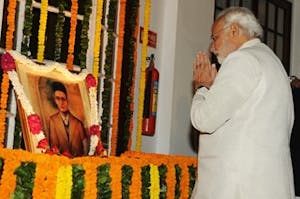*Please note this article has been written by an academic whose publications on this topic have been peer-reviewed to ensure they meet the highest levels of scholarship. This blog draws on current and upcoming research by both the author and other academics (for full details, please see the bottom of this post).*
Mention ‘Nazism’ and ‘Hinduism’ together and you may think of swastikas. We know that Nazi symbolism drew on various racist European anthropologies. Here, a mythical fair-skinned “Aryan” race subjugated India. In a socially-Darwinist spirit, they used religion as a political tool to establish a caste system which integrated the local population but maintained racial segregation.
The rise of today’s Hindu nationalism, and the fact that many white nationalists gaze admiringly upon it, forces us to reconsider the ways in which Hinduism was politicised and secularised not only in Europe – but in India itself – during the age of fascism.
The founder of Hindu nationalism, Vinayak Damodar Savarkar (1883-1966), took a decidedly amoral approach to politics. National sovereignty was his secular altar. Whether this was arrived at through the politics of class, populism, race, or religion was irrelevant. It was unity in political action that mattered and the ends justified the means. Savarkar commended Hitler for unapologetically representing the cultural and racial solidarity which had ostensibly prompted the country’s 1870-1 unification. If Jewish culture was imagined as undermining this, then for Savarkar, German antisemitism was simply an outcome of natural politics.

India was a different story. Historically, Hindu solidarity was civilizational not racial. Counter-intuitively, Savarkar praised Indian Jews for having politically and culturally assimilated into a Hindu civilization while simultaneously defending Hitler’s rabid antisemitism in Germany. Whatever process resulted in national sovereignty through passionate unity and the resulting mass conviction to fight and die for one’s country was fair game. It was in this spirit that Savarkar perversely praised the Zionist movement for transfiguring religion into a political identity in the same way that Hitler had elevated race to a political category.
Savarkar’s appreciation of Nazism, Hindu nationalism and Zionism was “secular” in that it had no moral content. It recognised only the common pursuit of group sovereignty through a passionate common identification that was artificially constructed through the prevailing political circumstances of each part of the world.
Likewise, by emptying religion or politics of any moral convictions, other Hindu nationalists also regarded Nazism as a form of secular political science. Of English and Greek-Italian descent, Maximiani Julia Portas hybridised Nazi, occultist and new age Hindu philosophy. From the 1930s, Portas travelled British India and gathered intelligence on behalf of the Nazis, eventually marrying a Bengali Brahmin (the highest caste in India) in 1940. Taking the name Savitri Devi, she propagated the idea that Judeo-Christianity had “corrupted” the paganism naturalism of Aryan civilisation and that the new politics of Nazism and Hindu nationalism alone could revive the “old Aryan tradition”.

Bastardising Friedrich Nietzsche’s antipathy to Christianity – as a religion of the meek – Portas viewed Hinduism as a scientific faith because it did not demand the repression of one’s passions. Rather, she ruminated, you visited a guru to channel those passions in a way that fits your true nature. Just like Savarkar, Portas wrote that “good and bad mean nothing” and all that mattered was the “higher purpose” for which you could organise your animal desires.
Portas admired Hindu reincarnation because it encouraged human striving in “lower” racial types and castes by the aspiration to be reborn as an Aryan. Simultaneously, it preserved social order in this life as the masses acknowledged the Aryan right to dominate. Portas admitted that this worldview was just an “hypothesis” but, in so far as it recognised the innate faculties and diverse passions of human beings, it was a far more scientific “propaganda” than the redemptive equality of the Judeo-Abrahamic faiths.
These German-Indian entanglements reveal a surprising relationship between political Hinduism and Nazism that is not straightforwardly reducible to committed racial or religious hatred. Instead, shifting forms of passionate political solidarity were regarded as a new science of politics to replace the atomising individualism of reigning political theories like liberalism.
Today, the rise of the alt-right and Hindu nationalism is partly explained through common bigotry. But as with Savarkar and Portas, growing intellectual exchange among the global far-right says less about immutable hatreds and more about a new intellectual crisis of what makes our societies political.
For more about the ideas connecting Hindu nationalism and Nazism, and the crisis of the ‘political’ in India, please see:
Here and here for summaries of Savitri Devi’s Nazism.
Here for some tentative links between the alt-right, Nazism and Hindu nationalism.
Faisal Devji on Hindu Nationalism’s “secular” ideology of politics. You can also listen the podcast discussion of the same here.
Shruti Kapila, Violent Fraternity in the Indian Age (Princeton University Press, 2021). For an overview, please click here.
Vikram Visana, “Savarkar before Hindutva: Sovereignty, Republicanism, and Populism in India, c. 1900-1920”, Modern Intellectual History (2020) [contact author]

“Vikram Visana is a lecturer in political theory at the University of Leicester. He is the author of Uncivil Liberalism: Labour, Capital, and Commercial Society in Dadabhai Naoroji’s Political Thought (Cambridge University Press, 2022). He is currently working on Hindu nationalism as a political ideology and a different project on caste and republican liberty.”
https://books.google.co.uk/books?id=KxMgPAAACAAJ&redir_esc=y
https://www.epw.in/journal/2016/53/review-article/hindutva-and-fascism.html
https://www.tandfonline.com/doi/full/10.1080/00856401.2015.1077924
https://www.tandfonline.com/doi/full/10.1080/0031322X.2020.1759861
https://books.google.co.uk/books?id=SAqn3OIGE54C&redir_esc=y
